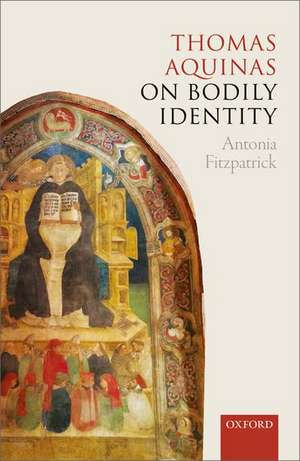Thomas Aquinas on Bodily Identity
Autor Antonia Fitzpatricken Limba Engleză Hardback – 25 oct 2017
Preț: 545.48 lei
Preț vechi: 782.06 lei
-30% Nou
Puncte Express: 818
Preț estimativ în valută:
104.41€ • 113.45$ • 87.76£
104.41€ • 113.45$ • 87.76£
Carte tipărită la comandă
Livrare economică 10-16 aprilie
Preluare comenzi: 021 569.72.76
Specificații
ISBN-13: 9780198790853
ISBN-10: 0198790856
Pagini: 214
Dimensiuni: 164 x 242 x 20 mm
Greutate: 0.5 kg
Editura: OUP OXFORD
Colecția OUP Oxford
Locul publicării:Oxford, United Kingdom
ISBN-10: 0198790856
Pagini: 214
Dimensiuni: 164 x 242 x 20 mm
Greutate: 0.5 kg
Editura: OUP OXFORD
Colecția OUP Oxford
Locul publicării:Oxford, United Kingdom
Recenzii
Fitzpatrick has produced a study as fascinating as it is important, shedding considerable light on an understudied aspect of Aquinas's teaching on human nature and bodily identity.
Fitzpatrick's book shows how vitally important it is to take Aquinas's theological commitments seriously when attempting to spell out his metaphysics. I am sure that Thomas Aquinas on Bodily Identity will be an important reference point for future research on the complex topic of the body in Aquinas.
Antonia Fitzpatrick has provided us in this book with a highly detailed and well-constructed study in which, as she justifiably claims, Aquinas can be shown in fact to have developed an account of our continuing identity in terms of the body rather than the soul. It is a book that should be of interest to Thomists, as well as theologians more generally, and students of medieval philosophy will certainly find it a very helpful study.
Fitzpatrick's book shows how vitally important it is to take Aquinas's theological commitments seriously when attempting to spell out his metaphysics. I am sure that Thomas Aquinas on Bodily Identity will be an important reference point for future research on the complex topic of the body in Aquinas.
Antonia Fitzpatrick has provided us in this book with a highly detailed and well-constructed study in which, as she justifiably claims, Aquinas can be shown in fact to have developed an account of our continuing identity in terms of the body rather than the soul. It is a book that should be of interest to Thomists, as well as theologians more generally, and students of medieval philosophy will certainly find it a very helpful study.
Notă biografică
Antonia Fitzpatrick is Departmental Lecturer in Medieval History at the University of Oxford's History Faculty and St. John's College. Prior to this, she was a Junior Research Fellow at St. John's, a doctoral and masters student at University College London, and an undergraduate at Wadham College, Oxford. Thomas Aquinas on Bodily Identity is her first book. She is researching a second monograph on Dominican and Franciscan intellectual traditions in the Late Middle Ages, and separately examining notions of harmony in medieval thought. Antonia is trained in Philosophy as well as History, and in addition to articles on Franciscan and Dominican debates about individuality and bodily identity, she has published on the relationship between modern historical modes of argumentation and formal logic.
